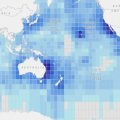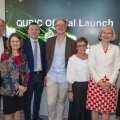The Australian Research Council has awarded Australian Laureate Fellowships to two of The University of Queensland’s brightest stars – marine biologist Professor Ove Hoegh-Guldberg and economist Professor John Quiggin.
“Ove and John have built global reputations in their fields, and are inspirational leaders within the University and among Australia’s academic community,” said UQ’s Deputy Vice-Chancellor (Research), Professor Alan Lawson.
“They certainly deserve these most prestigious of ARC fellowships.
“Ove Hoegh-Guldberg is a passionate advocate of the Great Barrier Reef.
“He excels in his role as director of UQ’s Global Change Institute, and as deputy director of the ARC Centre of Excellence for Coral Reef Studies, which represents the world’s largest concentration of coral reef scientists.”
Professor Lawson said Professor Quiggin had “apparently boundless energy and enthusiasm, and an obvious passion for economics and its applications”.
He had previously won two ARC Federation Fellowships, working on environmental problems associated with climate change and the Murray-Darling Basin.
“John has worked at UQ for a decade, and during his career has produced more than 200 refereed journal articles, six books, and well over 1000 research publications,” Professor Lawson said.
“On behalf of the University, I congratulate Ove and John for these awards and wish them well for their upcoming research projects.”
Professor Hoegh-Guldberg said it was a great honour to win an Australia Laureate Fellowship.
“There are few programs worldwide with the characteristics of this award,” he said.
“It will enable me and my team to pursue crucial questions on climate change and ocean acidification.
“This will give us great opportunities to develop research at Heron Island, which continues to be one of the premier research facilities on the Great Barrier Reef, if not the world.”
ARC funding would provide critical support to postdoctoral research fellows and research students, he said.
“The University of Queensland is a great place to work and I appreciate the continued support of the ARC,” he said.
Professor Hoegh-Guldberg grew up in Australia, and moved to the United States in 1983. He was awarded a PhD in Marine Biology from the University of California, Los Angeles in 1989. In 1992 he took up a position at The University of Sydney, later moving to UQ, where he helped establish the Centre for Marine Studies.
He has previously been awarded the Queensland Smart State Premier’s Fellowship, the Eureka Prize for Scientific Research, the Thomson Reuters’ ISI Highly Cited Researcher award, the Wesley College Foundation Medal, the UCLA Distinguished Scholar Award and the Whitley Certificate of Commendation for his book The Great Barrier Reef.
He was a member of the Royal Society’s Working Group on Ocean Acidification and a founding member of the Australian Climate Group, now Climate Scientists Australia.
Professor Quiggin is renowned as a public intellectual, gaining wide acclaim for his recent book, Zombie Economics: How Dead Ideas Still Walk Among Us, in which he argued that economic theory must change in response to the global financial crisis and the subsequent global recession.
“There are big differences between environmental and financial crises, but they both involve managing complex systems under uncertainty and preparing for events that are hard to foresee,” he said.
“As a result, insights into resilience and the precautionary principle, developed in my work on environmental problems, will have important implications for dealing with financial systems.”
Professor Quiggin’s Laureate Fellowship research project aims to explore unforeseen contingencies, also known as “black swans” or “unknown unknowns”, which pose serious difficulties for decision makers.
“We will look at how financial regulation can be improved to reduce the vulnerability of the financial system and the macroeconomy to unforeseen shocks,” he said.
Professor Quiggin said he wanted to be a researcher when he was at high school but “it was only after two university degrees that I finally decided to focus on economics rather than mathematics”.
He credits excellent public schools with great teachers for fostering his research interest and at university he benefited first from a scholarship provided by Australian National University, and from the Tertiary Education Assistance Scheme.
Professor Quiggin is a Fellow of the Econometric Society, American Agricultural and Resource Economics Society, and the Academy of Social Sciences in Australia. He was elected President of the Australian Agricultural and Resource Economics Society in 2011.
He has received numerous awards including the 2011 Distinguished Alumni Award from the University of New England, award for the best paper published in the Geneva Review of Insurance Research and the 2010 European Association of Agricultural Economists Quality of Research Discovery Award.
He has twice been awarded the Sam Richardson Prize for the best journal article in the Australian Journal of Public Administration.
The ARC said 108 Australian Laureate Fellowship proposals were submitted this year; 17 were successful. Four were awarded in Queensland — the other two went to James Cook University. Four were awarded to ANU, three to University of Sydney, three to Monash University, two to the University of Melbourne and one to the University of Western Australia.
Media: Professor Ove Hoegh-Guldberg, ph 07 3365 3555; Professor John Quiggin, ph 07 3346 9646; Fiona Cameron, UQ Communications, ph 07 3846 7086
.jpg)











